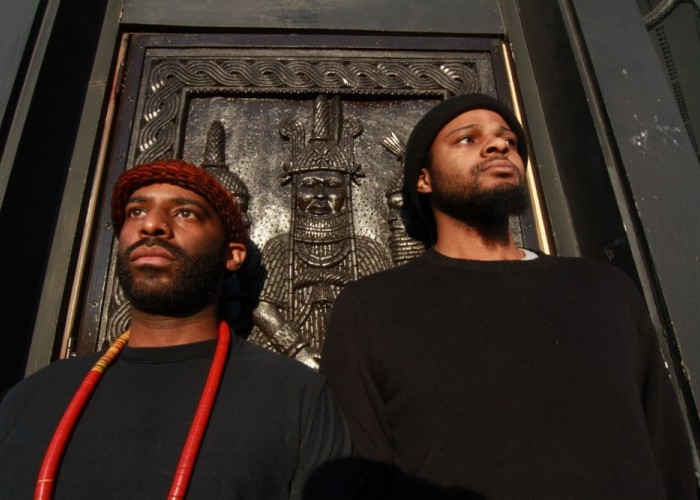Jan 13, 2026 2:09 PM
More Trump-Kennedy Center Cancellations
The fallout from the renaming of the John F. Kennedy Center for the Performing Arts to include President Donald…

Warren “Trae” Crudup III (left) and Luke Stewart released Blacks’ Myths (Atlantic Rhythms) on June 25.
(Photo: Thomas Sayers Ellis)Luke Stewart has become a ubiquitous presence in Washington, D.C. He plays electric or upright bass in one of nine bands; presents concerts through his efforts with CapitalBop; and hosts a weekly radio show on WPFW Pacifica. Then there’s the steady flow of new music.
The day before the June 25 release of his new disc—Blacks’ Myths (Atlantic Rhythms), a heady yet emotionally transcendental duo offering with drummer Warren “Trae” Crudup III—Stewart anchored a trio led by tenor saxophonist James Brandon Lewis in the city’s Goethe-Institut as part of the D.C. Public Library’s “Jazz in the Basement” concert series. The trio—which also featured Crudup—engaged in scalding, cathartic surges of energy during which Stewart provided as much bristling texture as he did rhythmic momentum and harmonic support.
Stewart’s been a member of Lewis’ trio for four years now; the two met in 2012 at New York City’s Brecht Forum, and connected immediately.
“I always felt like Luke and I were musically brothers from the very beginning; we always understood each other on and off the bandstand,” Lewis said. The saxophonist compares Stewart’s energy and fingering technique to Jimmy Garrison and Fred Hopkins.
On Blacks’ Myths, Stewart and Crudup craft evocative, Afro-futuristic grooves, frequently disrupted by eruptions of feedback dissonance or languid soundscapes. The title alludes to how black people have reinvented themselves in the aftermath of the Mid-Atlantic slave trade.
“Our history has been erased for the most part,” Stewart said. “Black people [in the Americas] don’t have a history, which means that we define ourselves in the unique position of having very little baggage. We can define ourselves in ways that we want to.”
Raised in Ocean Springs, Mississippi, and mostly self-taught as a musician, the 31-year-old Stewart has been reinventing himself in various ways ever since he started playing music down in the Magnolia State. While in middle school, he started playing saxophone, then briefly violin before moving on to the acoustic guitar. A school buddy of his, who also played guitar, was starting a rock band. “He told me to play bass. So, for my birthday, my mom got me a bass guitar. That’s how it happened,” Stewart recalled.
During his time in middle school, while he was playing the saxophone, he and his mother went record shopping. Because of his budding knowledge of John Coltrane, Stewart asked his mother to buy him some Miles Davis recordings. They came across Kind Of Blue and Bitches Brew. He asked his mother which one to get, and she suggested both.
Those records planted the jazz seed. Stewart soon started investigating Chick Corea, Ornette Coleman, Sun Ra and others through vigorous crate digging. He also acquired records from his uncle and grandmother. Stewart, however, was hardly on the straight-and-narrow jazz path. He continued pursuing his interests in rock, punk and hip-hop. When he attended the University of Mississippi in Oxford as an international studies major, he dabbled in turntablism and electronica, too.

Belá Fleck during an interview with Fredrika Whitfield on CNN.
Jan 13, 2026 2:09 PM
The fallout from the renaming of the John F. Kennedy Center for the Performing Arts to include President Donald…

Peplowski first came to prominence in legacy swing bands, including the final iteration of the Benny Goodman Orchestra, before beginning a solo career in the late 1980s.
Feb 3, 2026 12:10 AM
Ken Peplowski, a clarinetist and tenor saxophonist who straddled the worlds of traditional and modern jazz, died Feb. 2…

The success of Oregon’s first album, 1971’s Music Of Another Present Era, allowed Towner to establish a solo career.
Jan 19, 2026 5:02 PM
Ralph Towner, a guitarist and composer who blended multiple genres, including jazz — and throughout them all remained…

Rico’s Anti-Microbial Instrument Swab
Jan 19, 2026 2:48 PM
With this year’s NAMM Show right around the corner, we can look forward to plenty of new and innovative instruments…

Richie Beirach was particularly renowned for his approach to chromatic harmony, which he used to improvise reharmonizations of originals and standards.
Jan 27, 2026 11:19 AM
Richie Beirach, a pianist and composer who channeled a knowledge of modern classical music into his jazz practice,…